OFF-TOPIC (61)
By:
June 5, 2024
Off-Topic brings you over-the-transom, on-tangent essays, dialogues and subjective scholarship on an occasional, impulsive basis. This session, a chat with a classic original voice on once-upon-a-time futures and histories we’re charmed to repeat…
We owe all we are to bad influences. The young Jacob Kurtzberg’s life was changed when he retrieved a science-fiction pulp mag from the gutter in the slum he grew up in; he would follow the course it opened up for him to his own reinvention as Jack Kirby and the creation of most of what you see in multiplexes a century later. In Barda, the new graphic novel from the gifted cartoonist/writer Ngozi Ukazu, the titular warrior-woman retrieves a poetry book on a battlefield that starts opening her eyes to a different way of defining her life.
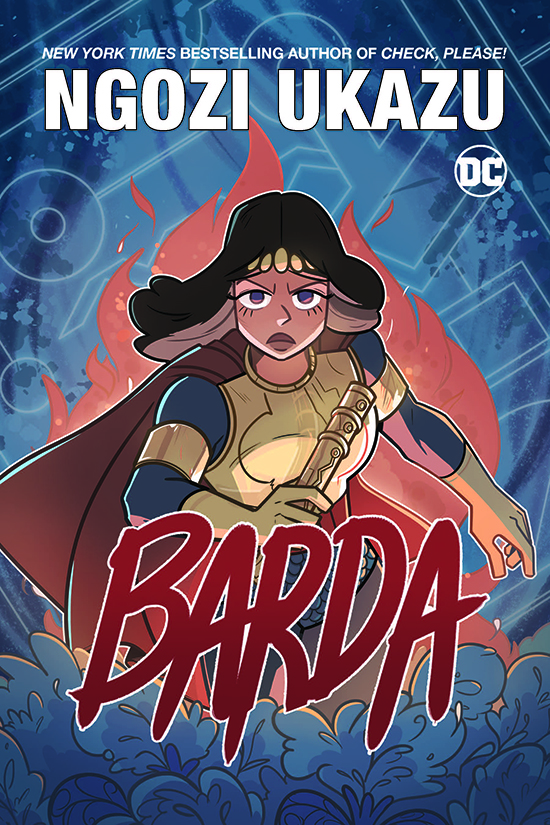
Kirby and Ukazu are connected across that century, through that character, whom Kirby created in his “Fourth World” comics of the early 1970s. The connection can come naturally because Kirby’s vision was leaping so far ahead of its era. A saga of cosmic “gods,” it has gathered a following over subsequent decades after being rejected in its day like all the best prophets. Consisting of three interlocking series — The New Gods, Mister Miracle, and The Forever People — meant to tell a finite epic and be collected in high-end book editions (commonplace now, inconceivable back when), the Fourth World followed two opposing planets, New Genesis and Apokolips, one committed to peace and culture and the other to violence and control, and the original sin that bought them a few years of peace: the swap of each world’s leader’s sons. Apokolips’ scion, Orion, is raised on progressive New Genesis with rages he can’t account for and which his society exploits for its own protection; New Genesis’ Scott Free, derisively named by his captors, is a kind soul raised as a child soldier in a gulag orphanage. The war reignites, threatening our own whole planet of innocent bystanders, when Scott finally escapes, to Earth.
He does so with the help of Apokolips-born warrior Barda, a story that Ukazu’s book retells from that character’s perspective. In this version, Scott is interned after his umpteenth escape attempt and Barda is assigned by their mutual “mother,” the orphanage’s cruel controller Granny Goodness, to break him; as their conflict mirrors the cracks between their better impulses and their brutal upbringing, she finds her heart breaking open instead.
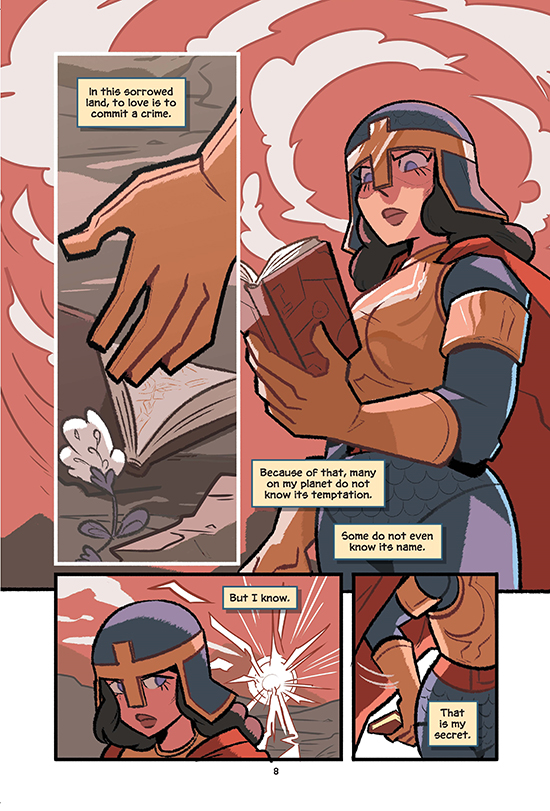
It’s territory Ukazu travels insightfully; her best-known work before this was another fable of embattled romance, the internet-comic phenomenon Check, Please!, which ran for four seasons and followed the tale of a highschool figure-skater, ardent baker and prolific vlogger who joins a college hockey team, overcoming his fears of contact-sport injury, finding his place within the supposedly hypermacho culture, and navigating his crush on the team’s star player. Even if you haven’t read it, you probably know that its print version scored the highest dollar amount of any webcomics Kickstarter of all time; only if you read it do you find out that it is the first great American comic strip since Calvin and Hobbes, deep in its incidental wise detail, endlessly amusing in its audacious human comedy, addictive in its daily drama, and vastly surprising in its instinctive plot twists while building to a masterfully orchestrated conclusion.
I had the good fortune to trade Kirby ultra-geekery and narrative theory with Ukazu as her next milestone chapters begin…
HILOBROW: Opening this book is an emotional experience for a Fourth World superfan since Kirby’s original vision was to have these stories presented as graphic novels, when that wasn’t even in the vocabulary. How does it feel to fulfill his legacy? What was it that spoke to you about taking up these characters — and was there anything that was daunting about taking on that legacy?
UKAZU: I will answer your last question first; doing anything in the legacy of Jack Kirby is daunting, because you have on your hands a creator… even outside of comics, it’s rare to be that prolific and that profound at the same time. Even when you’re looking at just Issue 1 of New Gods, I think is this tour de force, virtuosic — it’s almost a concerto, in terms of storytelling. Because he introduces the entire concept of the Forth World, New Genesis, Apokolips; we see Orion, we see Highfather, we see Lightray, we see Kalibak, we see — heck, we even see Victor Lanza [laughs], and all the Earth guys. So when a creator is dealing with any Jack Kirby property, any Jack Kirby character, you’re dealing with a lot so you have to really honor all of that, you can’t just treat it like another comic book. It is interesting, because Jack Kirby never — he got to realize so much of the Fourth World but a lot of it was cut short, New Gods ended prematurely. So getting to retell Barda and having an entire year-and-a-half, two years to fully realize it, having an editor, Jim Chadwick, emailing with him and [him] saying we can fine tune it however we want, it’s a luxury, it’s a real luxury to think about the Fourth World, and have time, in a way that maybe even Jack Kirby never got the chance to, because he was just going and going and going.
HILOBROW: I could turn that question on its head since Check, Please! had even more time to unfold, and even more so than the monthly comic book if follows the segmented form of the classic comic strip, and yet it accumulates to this really full feeling of a lived several years, which maybe it took that time to build. So were there new challenges to then do a done-in-one graphic novel, or was it similar since you had a long time to compose that too?
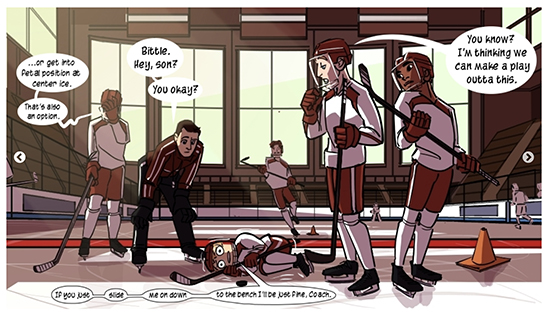
UKAZU: Doing a serialized story like how I did with Check, Please!, and having that constant reader feedback and interaction, it does something to the story. I know now people can read it all at once, but it does feel a little bit more lived in, you really feel that Bitty, the protagonist, has gone through all four years of college. Working on a graphic novel and working at it all at once, there’s different pros and cons; you get the ability to revise, tweak things, you get to even be a little bit more daring, because… not to spoil Barda, but the first few pages we see that Barda has a huge crush on Orion, which we all know that’s almost sacrilege to say. Had this been a serialized, let’s say, Webtoon, and I started Chapter One with Barda being like, “Ah, I’m in love with Orion,” I think that there would be riots on the internet, people’d be like, “What is DC doing??” [laughs]. But when you’re in the graphic novel and you’re in that storytelling framework, you get to play with the reader a little bit more, without worrying about the immediate shocking reaction as they’re waiting from week to week to get an update.
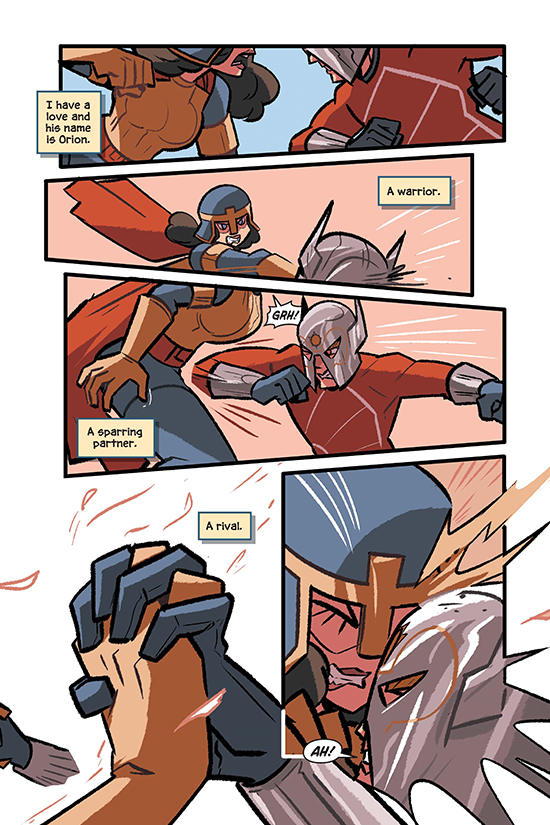
HILOBROW: Even though it was radical I thought it made perfect sense that she would have a crush on Orion; not only are they the two heaviest hitters of their worlds, but there’s a great irony when [taunting her for faltering in battle] he says he’s never seen anything rarer than a bleeding heart from Apokolips — you are a bleeding heart from Apokolips, dude! But self-awareness was never Orion’s strong suit…
UKAZU: Ha! I love Orion. In a blog post for DC.com I made an aside of how much I dislike when people malign Orion, I feel like I understand him [smiles] — I could go on a huge tangent about how I feel people get Orion wrong. I really think he’s a noble hero; he’s almost Jack Kirby’s purest character, because he’s filled with conflict, and filled with potential for great good and great evil.
HILOBROW: Kirby was always messing with social expectations of nature vs. nurture — it’s easy to say that Scott Free is “naturally” good since he came from New Genesis, but Barda was born on Apokolips and has a nobility that nothing can beat out of her. What is your take on how we can (as per Scott’s defining skill) escape the destiny that somebody tells us is ours?
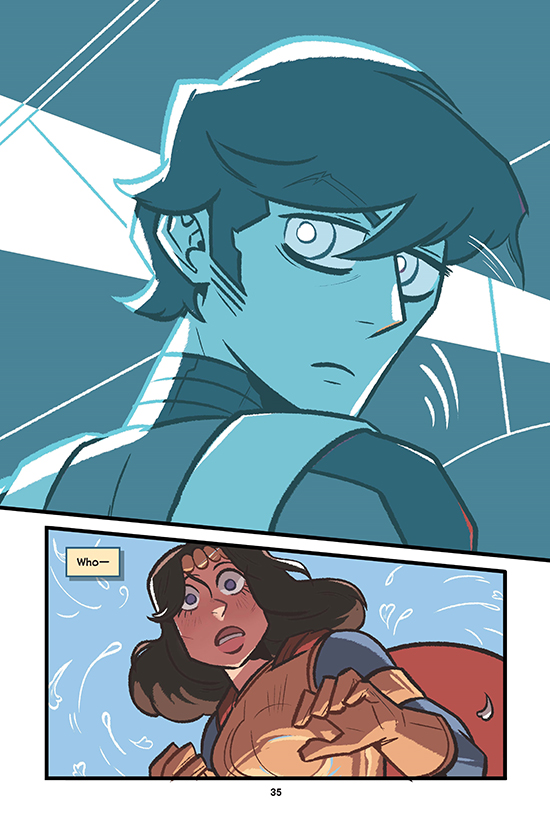
UKAZU: That is another thing that will get me — I actually have to like physically set a timer at dinner parties so I don’t talk about the Fourth World too much [laughs]. Because the great thesis of the Fourth World is that nature vs. nurture doesn’t matter, the nature argument or the nurture argument, all that matters is alignment with good. That’s what triumphs in Kirby’s universe. So any time you’re writing or thinking about the Fourth World, you’re really thinking about whether a character wants to be good, vs. whether or not that’s just a given — it’s a choice. Even with someone like Scott, I think in him there’s this choice to continually be good, and continually not lose hope. That is the big triumph of the Fourth World — it’s not a cynical story, even with so much of it taking place on Apokolips, it’s not cynical; it’s pretty straightfiorward that good beats evil.
HILOBROW: And after all, even though so much takes place on Apokolips it couldn’t be hopeless since basically Apokolips is the Lower East Side, right? Kirby knows that he got out!
UKAZU: That is a good — now I’m not from the Lower East Side, I’m not gonna say it’s Apokolips [laughs] — but that’s true, if Kirby could make that huge jump, just to become one of the greatest artists in the American canon, then yeah — he’s not a cynical person.
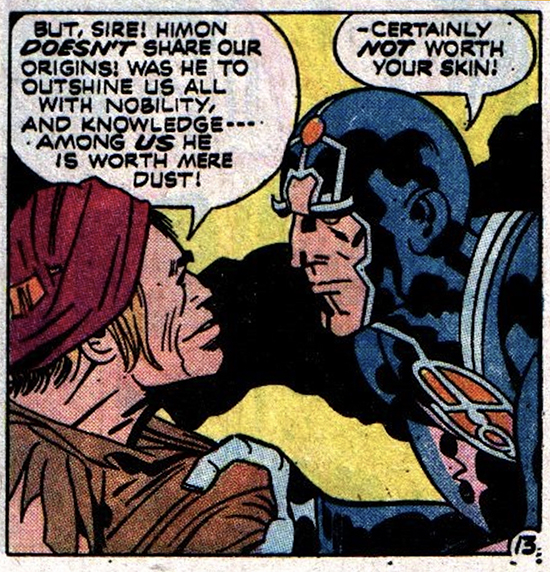
HILOBROW: And speaking of where he came from, so much of the Fourth World is centered in the perils and possibilities of crossing from one world to another, be it the culture clash between New Genesis and Apokolips, or the refuge of escaping to Earth. It doesn’t seem coincidental that both Kirby’s parents were from another country, and I know that your folks are too; does that help with your being able to speak Kirby’s narrative language in this case?
UKAZU: I hope. I’m first-generation, I was born in Houston, TX, my parents are from Nigeria, and I’ve been lucky to kind of live this American Dream. And also I know Kirby grew up from very humble means, and I myself had to do that. I won’t say I’ve had any experience as traumatic as WWII! [laughs] — but I’ve also had tough things in my life. But despite all that I’ve always been in love with storytelling, I’ve always been in love with heroes, so maybe there is that bit of parallel where we’re not cynical people — we’ve seen a lot of the darkness in the world, but despite that we’ve gotten, I know I’ve gotten a ton of lucky breaks, people have been very kind to me in my life, so I genuinely and generally believe that there’s a lot of good out there.
HILOBROW: That sense of inner experience really struck me about this book too — Kirby could be a very psychological writer; there’s that great caption in New Gods #1 talking about how “Orion’s face is a cloud which has hidden all paths leading to himself” (and there’s a great echo of that when Barda talks about how “Nobility radiates from him, but a rage seeps out too”) in your book. That kind of interiority is still new… at least in terms of anyone else’s version of these characters. Was taking this approach based on questions you’d always had about these characters that you decided to answer for yourself, or ways that you hadn’t seen them done before that you decided to try…?
UKAZU: Let’s go with the second, because I feel like the interiority of all of these Fourth World characters is a given; like — we keep going back to New Gods #1 [smiles] but there is that line where Lightray’s asking him what’s going on inside that mind of yours, and Orion’s like “I am two worlds, just like our worlds, New Genesis and Apokolips,” and I’m like, Oh, that’s a lot of conflict; and even in Mister Miracle, when Scott is escaping, he asks Barda, “Why are you helping me?” And she says “I don’t know, maybe I love fools.” And that, ooh, that line on its own; Kirby is probably a little bit more interested in displaying the action, and he had to do all that worldbuilding; since I don’t have to do any of that worldbuilding I get to focus on those lines and really tease them apart. Barda not really knowing her motivation but just acting on it, it’s great room for what’s going on in her mind. So it was just a delight to extrapolate all of those little clues into building the characters’ interior worlds.
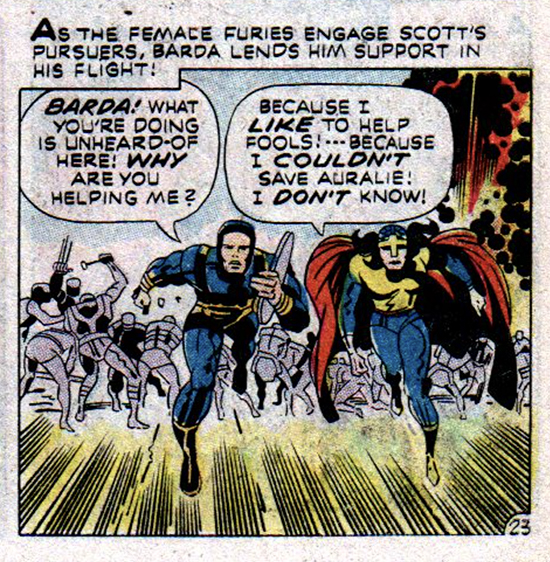
HILOBROW: It’s significant that you focus on that “I don’t know” line, since that’s one of the few lines that you lifted almost verbatim from the original comics.
UKAZU: Whenever I can I’m trying to lift lines verbatim; who’s gonna say it better than the person who created the character, and also, it kinda gives me some goalposts to make sure that I’m not wandering too far off from the original text.
HILOBROW: On another level about the “I don’t know” line, there was never anything explicitly queer about Kirby’s Fourth World (even though I’ve always shipped Lightray and Richard Sheridan, but that’s a whole nother article), but this state, which struck me even as a kid, of not having a vocabulary for your own feelings, that lack of access to being able to even describe to yourself who you are, seems like a queer narrative to me; since you delve into that so much in a story like Check, Please!, I wondered if there was a dimension of that for you in this book.
UKAZU: Barda and Scott — they read as a very queer couple. It is that type of romance where the gender roles are a bit reversed, there’s a confusion about what am I feeling, how do I access this; there’s even a bit of, they both feel like pariahs because their love is forbidden.
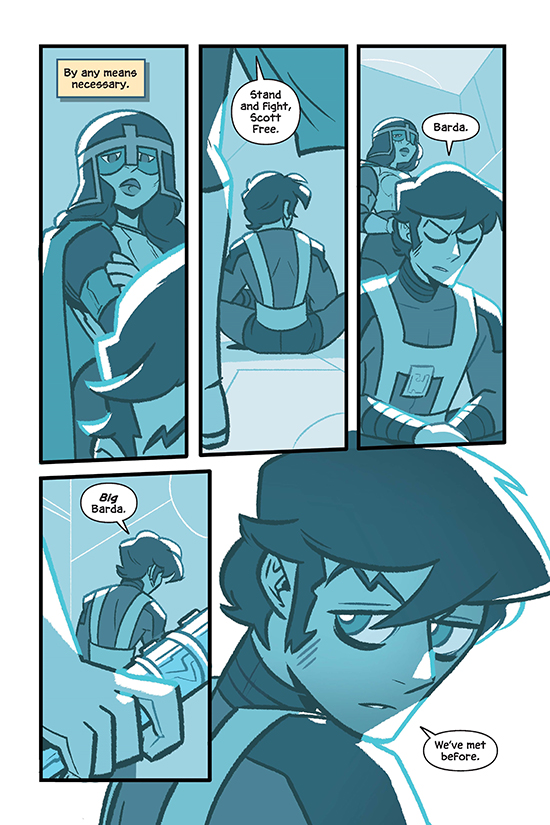
HILOBROW: Going back to what you said about original text, a lot of people can’t wrap their heads around Kirby’s language; it’s ironic that for a series created by somebody who was so known for his visuals, language is really the key to the Fourth World; the grandiose way these characters speak is really the key to their personality. A lot of writers used to think it’s their mission to make this “realistic.” But I got the impression — even down to the fact that we see one of the poetry books that they read — that you approached it almost as if it was an alien culture that you had studied.
UKAZU: I really don’t like it when Fourth World characters — I mean, I don’t mind when like, Scott or Barda talk very colloquially, Scott can say “Oh that’s groovy,” or if it was written today, “Oh that’s dope,” because he lives on Earth, and he’s so ready to embrace Earth culture; that makes sense. When you have a character like Orion talking like that it makes me uncomfortable [laughs]. I really even think that Apokoliptan dialect is different from how people on New Genesis would speak. It’s lofty, people often use the word bombastic when talking about Kirby’s dialogue, because these are gods, and to take away from that, you’re losing a little bit of what makes these characters not of our world. So yeah, it’s like approaching an alien culture, like, they would just use way more words to say something, because that’s how they think, it’s just a little bit more poetic.
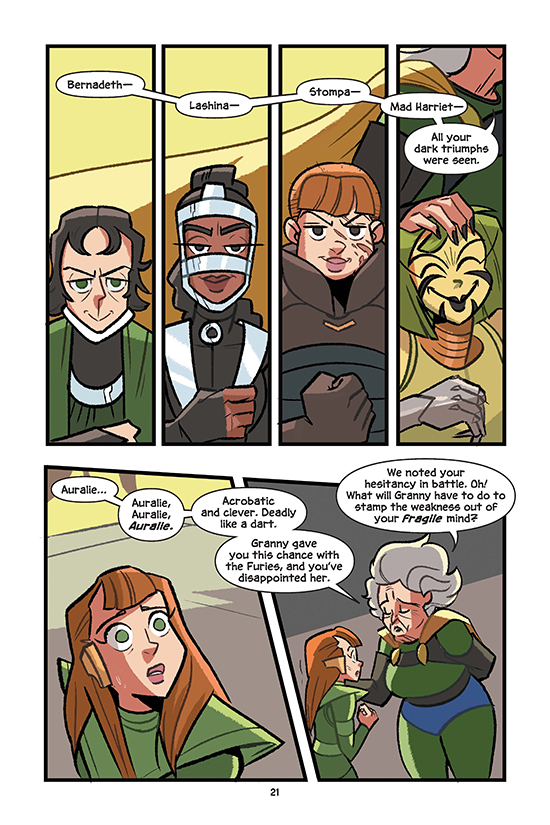
HILOBROW: You extended that to that great panel where Barda takes note of Himon’s accent! That got me thinking that comics can so dazzle us with concepts and visuals, that I often forget how they don’t take account of the other senses. The way she comments on his accent, describes both the smells and the tactile sensations of going through the Boom Tube [the New Gods’ means of interdimensional transport]… the only two other comic writers I could come up with who I’ve seen do this are Christopher Priest and Tini Howard. Is that something that came naturally to you, or you just thought, I haven’t seen this a lot in comics? (I also was curious if writing about athletes a lot has something to do with that since they are always acting on and so aware of sensation…)
UKAZU: To be honest I read a lot of books on prose writing as well; I would love to write a novel one day. And so much of prose writing… there’s this wonderful book by Monica Wood, it’s a textbook, and it’s just called Description. And it’s about… point of view, showing versus telling — and the interesting part of comics is people think that, “Well, it’s a visual medium, you can only show, you can never tell”; actually there’s a lot of telling that happens in comics, that kind of bogs down storytelling, so any time I can maybe show a character reacting to something — like how else are we gonna know about Himon’s accent (unless we change the lettering, or do something with its colors, or…) — I just want to make sure that other senses are present. Like in the beginning of Barda as well we have Granny Goodness monologuing about all the things she loves about Apokolips (cause she’s evil [smiles]), and she loves the smell of Apokolips, and I just [imagine] Apokolips smelling like industry, and war. That’s the stuff I think about all the time; we should — how does Metropolis smell, how does Gotham smell? I wanna know! That’s why I’m a nerd.
MORE POSTS by ADAM McGOVERN: OFF-TOPIC (2019–2024 monthly) | textshow (2018 quarterly) | PANEL ZERO (comics-related Q&As, 2018 monthly) | THIS: (2016–2017 weekly) | PEOPLE YOU MEET IN HELL, a 5-part series about characters in McGovern’s and Paolo Leandri’s comic Nightworld | Two IDORU JONES comics by McGovern and Paolo Leandri | BOWIEOLOGY: Celebrating 50 years of Bowie | ODD ABSURDUM: How Felix invented the 21st century self | KOJAK YOUR ENTHUSIASM: FAWLTY TOWERS | KICK YOUR ENTHUSIASM: JACKIE McGEE | NERD YOUR ENTHUSIASM: JOAN SEMMEL | SWERVE YOUR ENTHUSIASM: INTRO and THE LEON SUITES | FIVE-O YOUR ENTHUSIASM: JULIA | FERB YOUR ENTHUSIASM: KIMBA THE WHITE LION | CARBONA YOUR ENTHUSIASM: WASHINGTON BULLETS | KLAATU YOU: SILENT RUNNING | CONVOY YOUR ENTHUSIASM: QUINTET | TUBE YOUR ENTHUSIASM: HIGHWAY PATROL | #SQUADGOALS: KAMANDI’S FAMILY | QUIRK YOUR ENTHUSIASM: LUCKY NUMBER | CROM YOUR ENTHUSIASM: JIREL OF JOIRY | KERN YOUR ENTHUSIASM: Data 70 | HERC YOUR ENTHUSIASM: “Freedom” | KIRK YOUR ENTHUSIASM: Captain Camelot | KIRB YOUR ENTHUSIASM: Full Fathom Five | A 5-part series on Jack Kirby’s Fourth World mythos | Reviews of Annie Nocenti’s comics Katana, Catwoman, Klarion, and Green Arrow | The curated series FANCHILD | To see all of Adam’s posts, including HiLo Hero items on Lilli Carré, Judy Garland, Wally Wood, and others: CLICK HERE
